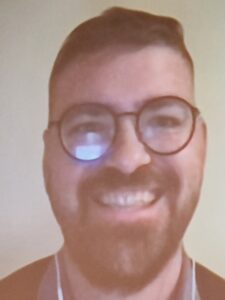

The Martha Trescott Prize will be given annually for the best published essay in one of two areas. In even-numbered years, the prize will be awarded to an outstanding published historical essay in the area of women in technology. In odd-numbered years, the prize will be awarded to an outstanding published essay in the area of social responsibility of engineers in history. Martha Trescott was one of the pioneering spirits behind Women in Technological History (WITH). She wished to honor Frances McConnell Moore, Carroll Pursell, and Edwin T. Layton, Jr., with this prize. The award consists of a $500 check and a certificate.

Owain Lawson, winner of the 2023 Martha Trescott Prize, attended via Zoom. (Photo SHOT)
Owain Lawson, University of Toronto
For “A National Vocation: Engineering Nature and State in Lebanon’s Merchant Republic.” Comparative Studies of South Asia, Africa, and the Middle East, vol. 40, no. 1, May 2021, p. 71–87.
The 2023 Martha Trescott Prize awards an outstanding published historical essay in the area of social responsibility of engineers in history. This year, the committee considered a large field of excellent essays, each of which shows how the history of engineering, as Trescott had hoped, is intertwined with the history of societal betterment. The articles focused on – and were written by scholars from – the United States and various places around the world. The authors included historians of technology, as well as scholars of literature, public health history, and architectural history. Out of this marvelous and wide-ranging field, the committee is pleased to award this year’s prize to Owain Lawson for his article, “A National Vocation: Engineering Nature and State in Lebanon’s Merchant Republic.”
“A National Vocation” highlights big state-sponsored engineering projects, offering a case study of a post-colonial government in a new independent state, Lebanon, in the twentieth century. Lawson examines tensions between elite actors, who hoped to see state engineering projects directly benefit the burgeoning trade economy, from which they benefited, and engineers, who envisioned state-sponsored infrastructure development that could support broader and more equitably distributed economic goals. Lawson illustrates the pathways – economic, academic, and experiential – that separated the elite from the bureaucratic engineers. At stake was the country’s emergence from French colonial rule and its redefinition as a modern, independent state. Lawson argues that the emerging engineering bureaucrats established a role for state-led development that could benefit both the (mostly urban) elites and the impoverished rural regions of the country. Lawson challenges James Scott’s widely regarded conception of the role of modern states in rationalizing landscapes by illustrating that bureaucrats with technical expertise in this specific modernizing state – Lebanon – executed a different vision of what central authority could do.
Based on his extensive research, Lawson makes a sophisticated argument, critiquing not only Scott’s interpretation but also previous views of Lebanese development, and in the process, he helps political historians understand how engineers affected politics. He uses his knowledge of many different aspects of history, including environmental, education, and gender history, to tell a nuanced, well-supported, and significant story.
Lawson’s article is a perfect match for this prize focused on the social responsibility of engineers in history. Left out of formal decisions, the engineering bureaucrats in post-colonial Lebanon tried to create change in the only ways available to them, advocating for their values and working “to engineer a larger, more inclusive, and more deeply penetrating central state.” (Lawson p. 77) Importantly, Lawson tells a story of a part of the world that is often left out of histories of technology. Yet the questions he asks and answers have application to other nations: how does the training of engineers affect their worldview? Who is promoting dams, and who isn’t, and for whose benefit? What are the consequences of a laissez-faire approach to development? What are the alternatives to that approach? Lawson’s article prompts us to consider the ways that engineers have thought about land, poverty, and access to resources – that is, to think deeply about engineers’ obligation to the societies in which they live and work, the focus of the Martha Trescott Prize.